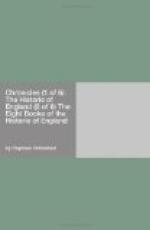THE XXIIJ. CHAPTER.
[Sidenote: EDWIN. 955.] After the deceasse of Edred, his nephue Edwin the eldest sonne of king Edmund was made king of England, and began his reigne ouer the same in the yeere of our Lord 955, & in the 20 yeere of the emperor Otho the first, in the 28 and last yeere of the reigne of Lewes king of France, and about the twelfe yeere of Malcolme the first of that name, king of Scotland. He was consecrated at Kingston vpon Thames by Odo the archbishop of Canturburie. On the verie day of his coronation, as the lords were set in councell about weightie matters touching [Sidenote: Will. Malmes. Polydor.] the gouernment of the realme, he rose from the place, gat him into a chamber with one of his neere kinswomen, and there had to doo with hir, without anie respect or regard had to his roiall estate and princelie dignitie. Dunstane latelie before named abbat of Glastenburie, did not onlie without feare of displeasure reprooue the K. for such shamefull abusing of his bodie, but also caused the archbishop of Canturburie to constreine him to forsake that woman whom vnlawfullie he kept.
[Sidenote: Iohn Capgrave.] There be that write, that there were two women, both mother and daughter, whome king Edward kept as concubines: for the mother being of noble parentage, sought to satisfie the kings lust, in hope that either he would take hir or hir daughter vnto wife. And therefore perceiuing that Dunstane was sore against such wanton pastime as the [Sidenote: Dunstane banished the realme.] king vsed in their companie, she so wrought, that Dunstane was through hir earnest trauell banished the land. This is also reported, that when he should depart the realme, the diuell was heard in the west end of the church, taking vp a great laughter after his roring [Sidenote: Dunstane seeth not the diuell.] maner, as though he should shew himselfe glad and ioifull at Dunstanes going into exile. But Dunstane perceiuing his behauiour, spake to him, and said: Well thou aduersarie, doo not so greatly reioise at the matter, for thou dooest not now so much reioise at my departure, but by Gods grace thou shalt be as sorrowfull for my returne.




